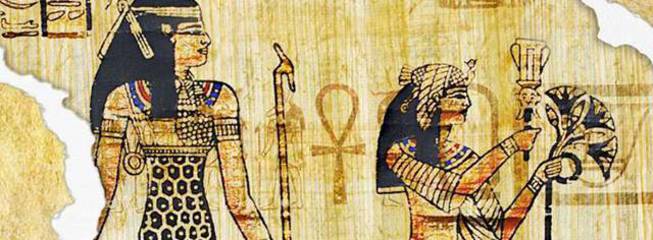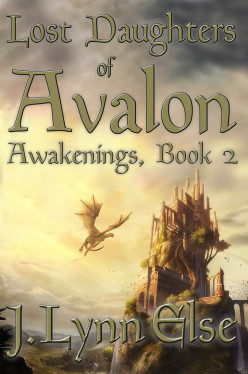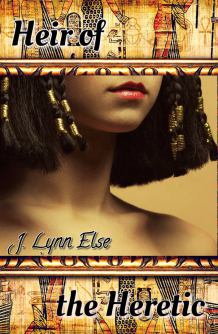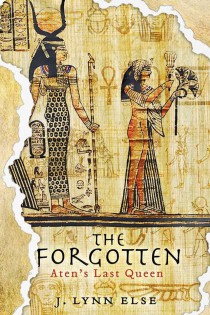
Post 1
How it began…
The exhibit, "Tutankhamun and the Golden Age of the Pharaohs," sparked the idea for my first book, which has now multiplied into two books. The exhibit revealed some fantastic exploration into the world of pharaohs with an emphasis on King Tut. Of our tour group, I took the longest time going through the exhibit. I loved standing in front of the pieces and simply gazing up at them. They were so beautiful.
One of my favorite pieces was a sketch done of Akhenaten's daughters. I loved seeing the light design carefully crafted and refined. Here's the image zoomed close to the face. See how delicate the lines are and how soft the edges appear? Just gorgeous. As someone who also sketches, this part of the exhibit was quite personal to me.

I knew from all I read and saw at this exhibit that the story of King Tut's wife needed to be explored! That's when I decided to explore her life through research and my own words...

Here is an except from my book Aten's Last Queen (and I hope you enjoy!):
Both Shadow and Light
1341 B.C.
The screams could be heard all across Akhenaten’s city that night. Henuttaneb was in labor, and it was not going well. Blood seeped into the tiles and across the floor as the birth women tried to deliver the new member of Akhenaten’s family.
The first child was always the hardest one. The nurses were frightened and confused as they did not know what to expect with the princess’s birth, and Henuttaneb had been in the birthing chamber far too long.
This was one of my first memories, and I was only 4 at the time. Those screams would never erase themselves from anyone’s mind that day. The smell of something terribly wrong swept the palace along the evening’s summer breeze. I could not tell what it was at the time, but now I recognize the smell as the opened doors into Duat. I was kept in a holding room with my nurse, but my two older sisters recounted the details of the night when I was years older and curious about my aunt.
As the light crept away from the sky and darkness descended, the young princess Henuttaneb began to drift through the Underworld’s doors. Merytaten, 9, and Meketaten, 5, had hidden behind a pillar and watched the terrifying scene. The birthing room had not been completely walled off from the nurses’ private rooms, and if you knew the palace well enough, you could sneak in during a birth. My sisters were excited for a new baby in the house, but they did not expect what they saw.
Henuttaneb had tried hard to deliver her child, but she could not get him out. Pharaoh’s doctor, Pentu, was called in. He felt inside of her where the baby was supposed to emerge from and said she was all twisted up inside, so he had to cut to find the little babe.
Meketaten had run away when Henuttaneb was cut apart, blindly running through the nurses’ rooms and out into a small patch of garden outside the harem’s quarters. She threw up for hours afterward. A nurse found her in the early morning light lying as if in a trance and staring out into the horizon. The sun’s light formed a blanket around her body, which had been bruised by the pillars and walls from her blind run. She kept calling out for Henuttaneb to leave Amun’s boat and return to them.
The nurse hid her the following day so she could calm down and stop talk of the god Amun, the one Father had banned first and foremost. Any mention of the cursed god would bring about severe punishment as the priests and followers of Amun were thought to be traitors to the livelihood of the throne.
Merytaten, my oldest sister, was rooted in place and found that she could not look away. As the doctor reached inside Henuttaneb to find the baby, Merytaten swore that she could see Henuttaneb’s ka slowly curling out from her body like steam off cooked meat. From that point on, Merytaten did not eat from animal flesh for fear that their ka would sneak into her body as Henuttaneb’s had risen out of hers. And though she loved her aunt, for fear of Henuttaneb stealing her body, no longer a person or an aunt but a dying spirit, a distorted and lost piece of a soul, Merytaten finally found the will to tear herself away. Her legs obeyed her again. She ran from the room and went to find our mother.
Nefertiti stood outside in a stony silence. She listened but did not enter. She feared that the demons ailing Henuttaneb would enter her womb and afflict her too, so she waited outside for cries of a baby. Her long body stood tense. Her hands rested on a small bulge in her belly as she waited for news. She was again showing the first signs of pregnancy.
Her graceful neck swept up into a face that was strikingly beautiful but angled with worry. Her lips were drawn thin, her high cheekbones were sharp, her almond-shaped brown eyes were wide and alert, and her dark hair swept down loosely across the tops of her shoulders. She wore no wig today and only a simple blue flax sheath dress which delicately flowed down from the top of her belly to her ankles. Two wide white straps came up from her belly, over her breasts, around the shoulders, and down her back. I remembered this dress. It was so smooth and clear that it looked like waves of the Great River had drunk in her body and would not let it go. Her only jewelry was a golden full-bloom lotus blossom necklace given to her long ago by Akhenaten, but that was before he knew the touch of another woman’s body against his. It was a gift to protect her when he was not there, and she found herself wearing it more often of late.
As confident as my mother appeared, she was fragile when it came to any other woman pulling away her husband’s attention. Henuttaneb, my father’s younger sister, had always been close to him. When Nefertiti could not produce a son of her own, he then turned to his sister, the last sibling in his family still alive. Though this is quite common for royalty, Nefertiti thought her family would be different. She had captivated the Pharaoh’s attention and entranced a nation. Yet he took a second wife, Tadukhipa, or Kiya as Pharaoh called her playfully. Tadukhipa was a princess from Mittani. She was exotically beautiful and smart. She could prove resourceful when dealing with foreign dignitaries. Mother had found relief when Tadukhipa had produced a daughter as well. She had assumed that Pharaoh would realize he needed no other women in his life. But this was not the case. Bruising my mother’s heart again, father had then taken Henuttaneb to his bed in hopes of producing a son. Around the dawn of my third year, Henuttaneb was made Pharaoh’s third wife.
Nefertiti had tried to console herself in a thin hope that Henuttaneb would become just a harem girl. With running a new capital city and stomping a family of deities from existence, how could Pharaoh possibly find time for a third wife? But, again, she was wrong. Pharaoh felt a strong connection with Henuttaneb. She could often make Akhenaten laugh with stories of their youth together and with her sharp wit. Nefertiti was bred for the life of a queen, and though she excelled in running a kingdom alongside her husband, she lacked the ability to share intimately her private thoughts and emotions. It made her feel stripped, unprotected, and so her Akhenaten fell more and more for the ba that filled Henuttaneb. Pharaoh loved those qualities which made Henuttaneb who she was, the person which my mother was not. Slowly, Nefertiti realized that Henuttaneb had the power to become a greater wife than her. She saw herself slipping into obscurity, and she was scared.
My mother was strong. She was the daughter of Ay, one of Amenhotep III’s favorite troop commanders as well as Tiye’s brother, the woman who was Amenhotep’s Great Wife. On top of entertaining visits from the Queen of Kemet, Mother had grown up with her own lively and vivacious mother who could run a household full of soldiers with ease as well as service the needs of Nefertiti’s Queen-Aunt. Nefertiti had always been surrounded by power and royalty. She was the flower of a smart and resourceful woman as well as a tactical and thoughtful father, and Nefertiti possessed all of these traits. Both of her parents were engaging and bold in personality. Nefertiti’s presence alone commanded that kind of attention. She got it from her people, but her husband seemed to draw more and more distant from her with each passage of Ra’s boat across the heavens. Henuttaneb was the final blow. She knew that something was changing. She knew that Akhenaten had some other plan for her. The people were beginning to call for her more than him. They prayed to her and worshipped her. It was her greatest pride, but it was the biggest crack in her marriage to Pharaoh.
Nefertiti was driven to help her husband, but she was becoming too great. Did she know then that Pharaoh was bound to fail? She worked endlessly and believed she was establishing his authority, leading his people in the belief of Aten, but Pharaoh’s own pride got in the way. She was taking his place even though she never meant to. And because of this, Nefertiti did not know what this night, this birth, would mean for her.
As she listened to the screaming behind closed doors, she could not help but wonder if this pain was her fault. Her fault for going too far? How many nights had she cried silently in agony that her husband no longer loved her as much as she did him? If Henuttaneb gave Pharaoh his long-sought-after son, she knew that her position would collapse. But what feared her most was figuring out what meant more to her -- her people or her husband. In truth, she loved her people passionately. She wanted to lead them. If she lost them too, she was not sure what she would do. She wanted to cry out --
Silence…
The night seemed to disappear into nothing but silence.
It was a ringing silence – a silence that was a haunting echo of what had once filled the halls moments before. It was a shadow in the ears, which only seemed to grow louder and pushed away all other sounds in its wake. Not a heartbeat could be heard as all thoughts became still and empty.
Then the clear sound of a baby crying broke the night air like an egg’s shell tapped by a spoon. Nefertiti began to pick at her fingernails, a sign that she was nervous. Could this lesser wife have produced what she could not? Did Henuttaneb give her Akhenaten a son? Her heart seemed to start beating again, but this time it was beating double than she thought possible. Merytaten came out from the shadows and ran to stand beside her, but the queen took no notice.
The crying grew louder as the baby was carried closer to those outside the birthing room. Ever so gently, the doors drifted open and out came a nurse, Maia, with a tiny baby just starting to settle down in her arms. The child drank from the nursemaid’s breast. Though Maia’s body was like soft linen wrapping around the small baby, her eyes were frightened. She stood silently for a moment before the queen. As she bowed her head, she released the words she knew the queen dreaded.
“Queen Nefertiti, it is a boy.”
The moment had come. Pharaoh had his son.
If the queen was shaken by this news, no one could tell. The women in my mother’s close circle knew of Nefertiti’s secret desire of Henuttaneb producing a female. It is something only women could understand. But it was also a way for my mother to believe that she had done nothing wrong. A way to reassure that she had not failed…
Instead of anger, though, Nefertiti expressed joy. She stretched out her long arms toward the baby.
“Hand me our new prince. I wish to hold my pharaoh’s son. I must tell him of the good news!” she said regally. Maia still had a shroud of nervousness floating about her body, fearing a secret emotion in the queen’s heart, but she gently pulled the baby from her and handed him over. She could not deny a request from Pharaoh’s Great Wife. Nefertiti’s head was held high as she took the little boy in her arms.
The baby’s eyes were bright when he looked up at the queen. All was hushed. It was as if he knew royalty when he saw it. He laid in her arms and simply stared at an errand strand of hair which gently floated along the queen’s cheekbone. The rest had been tucked gently behind her ear.
“My queen, Henuttaneb has been taken into the world of the dead.” Maia’s voice was heavily weighted with emotion.
The queen simply looked down at the boy and began rocking him gently. It was as if she had not heard the nurse. Maia was about to speak again when Nefertiti finally interupted the mournful stillness surrounding them, “Pharaoh must know of this right away. Our God, Aten, has sent us a message.”
Maia bowed her head in grief. She had been with Henuttaneb during the pregnancy to help ease things for her and try to ensure a healthy labor. But before the tears could fall, there were orders to be followed.
“Clean up this mess with the other attendants that were present. Pharaoh should not be troubled by this sight. Burn the remains so we make sure the demons no longer linger to infect the rest of us who continue to bear Pharaoh’s future.” Then Nefertiti smoothly turned away.
Maia began the preparations for the cleanup and for the pyre. It was obvious by the queen’s tone of voice that there would be no funerary rites. Henuttaneb was to be burned along with anything else associated with her. It was the worst sort of command, to destroy the body and thereby lose the soul itself. But with great sickness and fear of an evil that could spread, there could be no other choice. At least, that is how I understood mother’s motivation behind her directives. The other more vengeful motivation is one I do not think my mother would dare let drive her decisions. She would have to answer for it in the Afterlife if that was her real reason for erasing Henuttaneb’s existence.
Nefertiti purposefully walked to Pharaoh’s chambers with Merytaten close behind, the two traveling silently away from the sadness and turmoil nipping hungrily at their heels. Mother’s moves were lioness-like in their elegance and strength. They never seemed to waver in their sureness of purpose. Her body was always sleek and graceful even when it was filling with child. She could intoxicate all men around her, but she only wished for the devotion of one.
The walk to the pharaoh’s chambers was all the way across the palace from the harem’s quarter. Henuttaneb had not yet moved into the royal apartments as construction of her room was unfinished, and thus she had delivered her child where she had spent her days. The harem quarters were decorated lushly and had its own garden area. But this paled in beauty the closer one got to the royal house where extraordinarily more colors and details could be found.
It was amazing what my father had accomplished in such a short period of time. The palace was a beauty to behold. It lay in a perpendicular line to the Great River and rested in the perfect spot to absorb the long arms of Aten, which were ever reaching down to warm His followers. The light reflected across the floors, giving them the appearance of a smooth surface like that of the Nile on a calm morning. It was a testament to the beauty of Aten. At this moment, though, it was dark and somber all around Nefertiti. The smell of blood was beginning to permeate the corridors and up onto the bridge, which took mother over the Royal Road and into our house, despite the nursemaids’ best efforts to clean up the mess that was left of Henuttaneb.
A sharp sound preceded her, the staccato clicking of Nefertiti’s sandals as she walked. Merytaten’s feet were a delicate rustling against the floor like grass brushed against itself by the wind. Otherwise, there was no sound around them. It was as if all life had disappeared except for four footfalls stippling along the torch-lit gypsum tiles. The firelight danced on the colored pillars and floors making strange shapes and reflections off the beautiful structures. Even the golden doors and decorations, gold being the precious skin of the God Aten, seemed menacing as the firelight played with it and contorted its images. Fire was a tricky element, using both shadow and light to deceive.
My mother walked up to the second level of rooms. This was where Pharaoh and his royal wives slept. She passed by the guards outside Pharaoh’s quarters quickly as they parted his doors for her. They did not even have time to announce her arrival.
His chamber was lit with dozens of candles. He paced nervously across the floor until he saw Nefertiti. At that moment, his heart seemed to sink a little. It was as if he already knew what was about to be said. Merytaten had never seen such a look before. She decided to stay in the gloom where the candlelight would not touch her in case her father got angry. The last thing she wanted was to be noticed when Pharaoh got mad.
Nefertiti spoke clearly and crisply, “My Pharaoh, my beloved, the good God Aten has spoken. He has taken Henuttaneb into the Underworld. His message is clear; this son is to be my son. We will raise him as our own. Aten has decided to bless me with this child, a son Henuttaneb was unfit to bear, and I bring him now to you, my love.”
Her voice seemed to ring across the entire palace. By morning, everyone knew of Queen Nefertiti’s son. Henuttaneb’s place would be forgotten quickly, her life erased from the walls of our house. A wet nurse would provide the baby with the nourishment he needed as he grew. “It all fit together, designed well by the God” the servants would say as convincingly as they could. Some of them had been with Pharaoh’s family since before Akhenaten's birth. They knew the royal family like their own. They had loved Henuttaneb and had a hard time seeing her erased from their lives. Being one of the youngest of her siblings, she had the privileges of being a princess but without the stress that weighed on her older siblings. Though slightly spoiled, she had always been cheerful and abundant with her smiles. She resembled her mother, Queen Tiye, more than any child. Now a goodbye could never be given to her. There was no tomb to leave offerings and prayers. There was nothing of her life left.
Later that night, a celebration was held, and the bells of the temples rang clear for the new baby. No one asked questions, they would all accept the new child of Akhenaten and his great wife. Temple carvings were begun in a few short hours after the baby’s arrival. The carvings never said Nefertiti was his mother, but they did not use his birthmother’s name. I never asked why this was for fear of mother’s answer and a menacing spirit lingering behind it… just like I never asked about burning the body.
“What shall we call our new son?” Nefertiti asked awakening Pharaoh from his mournful silence. “He looks just like his handsome father. He is a strong and worthy heir for our lands!”
Nefertiti brought the babe to Pharaoh. Father was tall, a head taller than my mother, but this did not make him a lean man. His thighs had girth to them that were not from muscle. He had a small protruding belly that stuck out over his belt, which he never tried to conceal. His face was long and thin with sharp cheekbones. He had narrow eyes and full lips. His chin and neck seemed flow together as if one piece, like the trunk of a young tree. His fingers and toes were elongated. His eyes were a deep blue and could command attention. If smiling, he was not an unattractive man. In fact, all his features seemed well-crafted when absorbed together.
Though a little shaky, Akhenaten’s strong arms wrapped around the little boy protectively. He enveloped his son close to his chest, as if Akhenaten was trying to grasp the last of Henuttaneb’s life which had slipped out of the palace. His eyes glistened with tenderness, and he took in a deep loud breath.
Though Akhenaten seemed to struggle for a moment to speak, he did not cry. Merytaten always said how scared she was to see our father tremble and hesitate in such a way. He was always so confident and strong. But in private, his strong façade quickly faded into that of an emotional man who loved his family and his self-driven religion deeply. In moments like this, he let his emotions waver ever so slightly in the presence of his wives. He feared the people would think him mad showing such a display of feelings, but he needed these moments to let go of the conflicting emotions that tormented him during his days in keeping his monotheism strong and avoiding conflict from the former priests of those now-unnamed gods. He would even keep his emotions hidden from us, his daughters, lest rumors spread from our mouths accidentally. It was a difficult and draining task every day to run this new kingdom, but he kept strong for everyone outside and around the palace.
Right now, this was a time when he was allowed a little emotion. Merytaten stood still, hidden in the darkness which danced in the candlelight and filled the corners of the room.
Pharaoh’s voice was thick as he spoke, “Our God has sent us a blessing, so we shall call him what he is, the living image of Aten. Prince Tutankhaten.”
The room was quiet then, and Merytaten thought this moment as a good time to slip away. She could not escape our mother’s notice though. They say a mother always knows, and when Nefertiti called Merytaten’s name to stop her, she did not sound surprised by her presence. Merytaten could not even recall mother’s eyes cast toward her.
“Mayati, my curious girl, gather the princesses. They must meet their new brother.” Nefertiti ordered, her voice filled with a hint of slyness as if she shared in the secret of Merytaten’s eavesdropping.
Mother’s voice was its own supple, sharp whip. The softness to her tone was almost worse than a harsh reprimand. It made us think that no matter what we sisters did, our mother would always know. Mother was very smart, and she was very good at planting seeds and watching them grow. This was just another of her seeds that she used for Merytaten to warn her not to try to sneak up on her or her husband again.
Merytaten looked toward her father, but he did not seem to see her at all. He only had eyes for his new son. Merytaten quickly left the room confused, scared, and on command.
It was then that Nefertiti and Akhenaten were alone with the newborn boy. Nefertiti stood straight and tall beside Akhenaten as he took a seat in a chair. He simply stared at the small child whose life had taken away another’s. By now, Tutankhaten had fallen asleep.
“My son,” he said quietly.
“Our son, my beloved,” Nefertiti cut in.
Finally, Akhenaten looked up at his first wife. His eyes were a mixture of sadness and joy. His voice was quiet and peaceful, but it was also firm enough to keep his eager wife quiet, “By Aten, this may be His will, but it is not easy for me to accept. Please, my love, allow me this moment to mourn my sister.” He then continued to gaze at his son.
And all was quiet for but a moment…
Post 2

I write under a pen name and actually had a Facebook poll with my friends and family as the voters! I offered various ways of spelling my first & middle names along with my married and maiden names. The one I use was actually tied with another option, but I liked this one the best. And it uses my maiden name. You are welcome to call me as Jessi.
Post 3
Historical Fiction Genre Tour:
Visit Facebook:
Check out our Facebook page in which you can post questions to authors, make book recommendations, and follow activities happening live during the CyCon. This can be found here (live on April 7): https://www.facebook.com/events/HistoricalFictionCyConEvent
Stop by Goodreads:
Our Goodreads booth is located at: https://www.goodreads.com/HistoricalFictionBooth
At our booth you will find:
Meet-the-Author Q&A
Historical Fiction World Building Q&A
Modern-day Job Interviews and Historical Characters
Author showcases
Visit other events where history comes alive:
Giveaways: http://b2bcycon.com/giveaways/
Cover Wars: http://b2bcycon.com/cover-wars/
Book Expo: http://b2bcycon.com/book-expo/
Post 4
Historical Fiction events:
Blog hop (compiled by another manager)
Historical fiction Goodreads fairgrounds: https://www.goodreads.com/topic/group_folder/332206?group_id=154267
Get to know the author Q&A: https://www.goodreads.com/topic/show/18546352-get-to-know-the-author-q-a
Writing Historical Fiction Author Q&A: https://www.goodreads.com/topic/show/18546351-writing-historical-fiction-author-q-a
Facebook event group: https://www.facebook.com/events/754660571364391/?hc_location=ufi
Places you can find me after today:
Website: http://www.teasippinnerdymom.com/
Blog: http://teasippinnerdymom.blogspot.com/
Facebook: https://www.facebook.com/teasippinnerdymom
Twitter: https://twitter.com/AtensLastQueen
Goodreads: https://www.goodreads.com/author/show/7275724.J_Lynn_Else
Amazon Author Page: amazon.com/author/jlynnelse
CreateSpace: https://www.createspace.com/4930848
Smashwords: https://www.smashwords.com/profile/view/teasippinnerdymom
Instagram: https://www.instagram.com/jlynnelseauthor/
Google+: https://plus.google.com/JLynnElseteasippinnerdymom/posts














